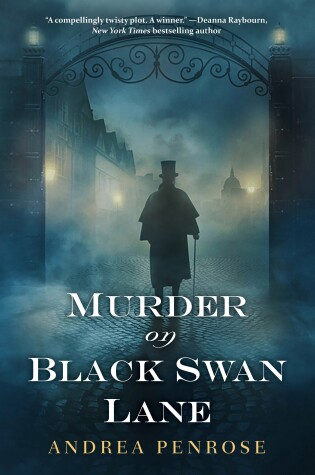
In Regency London, an unconventional scientist and a fearless female artist form an unlikely alliance to expose a cold-hearted killer . . .
The Earl of Wrexford possesses a brilliant scientific mind, but boredom and pride lead him to reckless behavior. So when pompous, pious Reverend Josiah Holworthy publicly condemns him for debauchery, Wrexford unsheathes his rapier-sharp wit and strikes back. As their war of words escalates, London’s most popular satirical cartoonist, A.J. Quill, skewers them both. But then the clergyman is found slain in a church—his face burned by chemicals, his throat slashed ear to ear—and Wrexford finds himself the chief suspect.
An artist in her own right, Charlotte Sloane has secretly slipped into the persona of her late husband, using his nom de plume A.J. Quill. When Wrexford discovers her true identity, she fears it will be her undoing. But he has a proposal—use her sources to unveil the clergyman’s clandestine involvement in questionable scientific practices, and unmask the real murderer. Soon Lord Wrexford and the mysterious Mrs. Sloane plunge into a dangerous shadow world hidden among London’s intellectual enclaves to trap a cunning adversary—before they fall victim to the next experiment in villainy . . .
“Thoroughly enjoyable . . . with sharp, engaging characters, rich period detail, and a compellingly twisty plot, Andrea Penrose delivers a winner.”
—Deanna Raybourn, New York Times bestselling author
“Fans of C.S. Harris take note! A riveting ride through Regency London, from the slums of St. Giles, to the mansions of Mayfair.”—Lauren Willig, New York Times bestselling author
“Historical chemistry meets alchemy . . . A delight of a book.”
—Joanna Bourne, award-winning author
This is one of those books that I liked in spite of demonstrable problems; a good example of when characters can overcome the flaws in a plot.
Lord Wrexford is an accomplished chemist and has the means to devote his time to it in the privacy of his own home. He has a rather black reputation, although it's never specified why; only off hand references that include womanising, a disrespect of protocol, and a dismissive attitude about social conventions. He has a valet named Tyler that acts as his lab assistant and all-around Bunter, only with a sharper tongue. I like Tyler.
Mrs. Sloane is the widow of the famous satirist A.J. Quill. An even better artist than her late husband, she secretly picks up his pen after his death to stave off certain penury; she also allows two homeless waifs known only as Raven and Hawk to shelter in her downstairs, feeding them when she can, and attempting to educate them and give them a bit of polish. Mrs. Sloane is up to her eye-balls in secrets, her new profession seeming to be the least of them. She reads and speaks Latin, and has a copy of DeBrett's in her desk drawer. Half this book's weight is comprised of hints about Mrs. Sloane.
Wrexford has been verbally and publicly sparring with an influential member of the church. When the man is found dead with chemical burns on his face and his throat slit, Wrexford is the obvious suspect and is set upon by a Bow Street Runner. And all the while Quill has been faithfully satirising the events, with details that are frighteningly accurate. Wrexford sets out to find out who the mysterious Quill is, and when he does, strikes a bargain with her: His continued silence in exchange for access to her information network in order to prove his innocence.
So far, so good. Even though this isn't a new premise, I can't help but get sucked in. Unfortunately Penrose's plot doesn't really work. It's two different plots that she attempted to merge into one with a single weak scene. What could have been a very tight and gripping plot ended up being undermined by the forced connection, and left clunky and underwhelming. This, combined with much too heavy-handed hints about Mrs. Sloane's 'mysterious' past resulted in a book that was good, but not great, and only mildly entertaining when it could have come closer to edge-of-your-seat stuff. Penrose also qualifies for the dubious award for most overused idiom. I love the phrase "pot calling the kettle black", but using it a dozen times in the same book is an excessive display of exuberance.
Still, Penrose has put together a great cast of characters and I'm interested in finding out what happens to them next. I'm hoping, too, that subsequent books (there's at least 1 more out now, and 1 planned, I think) will see her finding her groove and writing stronger stories.
Reading updates
-
26 March, 2018:
Started reading
-
27 March, 2018:
Finished reading
-
27 March, 2018:
Reviewed
